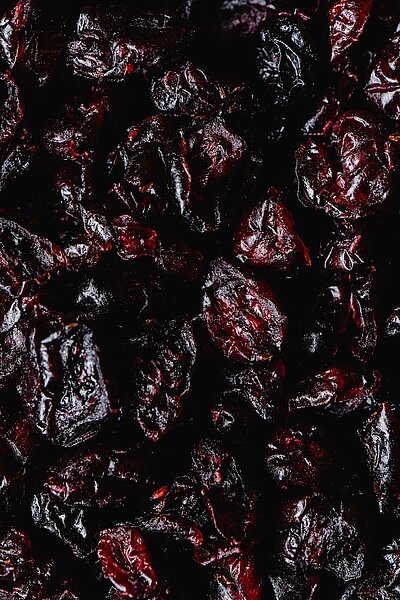Raisin

What are raisins and why are they poisonous to dogs?
Raisins are made from ripe grapes that are dried. They lose most of their moisture in the process, but not their sugar content. Around four to five kilograms of grapes are needed to make one kilogram of raisins. Raisins can come from different grape varieties and have different names, such as currants, raisins or raisins.
Raisins are poisonous to dogs because they contain one or more substances that are harmful to the dog's organism. Exactly which substances these are has not yet been clarified. It could be pesticides, molds or a substance in the grapes themselves. The consequence of raisin poisoning is acute kidney failure, which can be fatal for the dog.
How many raisins are dangerous for dogs?
There is no precise indication of how much raisins are dangerous for a dog. This depends on various factors, such as the size, weight and tolerance of the dog. Some dogs show no symptoms after eating raisins, others react very sensitively to even small amounts.
According to an American study, an amount of around 20 grams of grapes per kilogram of body weight can trigger kidney failure in dogs. This corresponds to about 5 grams of raisins per kilogram of body weight. Other reports indicate that even a smaller amount of 10 grams of grapes per kilogram of body weight can lead to poisoning.
To be on the safe side, you should not feed your dog raisins or give him food that contains raisins. Also make sure that your dog does not pick up raisins from the ground or eat them from the garbage.
What symptoms does a dog show after eating raisins?
The symptoms of raisin poisoning can vary depending on the dog and usually appear within 6 to 24 hours of eating them. The most common signs include:
- Vomiting
- diarrhea
- Loss of appetite
- abdominal pain
- lethargy
- weakness
- dehydration
- fever
- trembling
- shortness of breath
- Blood in the urine
- Decreased urine production or no more urine
If you notice one or more of these symptoms in your dog, you should see a vet immediately. Quick treatment can be life-saving.
How is raisin poisoning treated in dogs?
The treatment of raisin poisoning in dogs depends on the severity of the poisoning. As a rule, the vet will try to remove the ingested raisins from the dog's gastrointestinal tract. This can be done by vomiting or gastric lavage.
The vet will also provide the dog with fluids to support kidney function and flush the toxins from the body. In some cases, a blood transfusion or dialysis may also be necessary.
The prognosis for a dog with raisin poisoning depends on how quickly treatment is given and how badly the kidneys are damaged. Some dogs recover completely, others retain permanent kidney damage or die of kidney failure.
How can I prevent raisin poisoning in my dog?
The best way to prevent raisin poisoning in your dog is to avoid feeding him raisins or giving him access to foods that contain raisins. Keep raisins and other dangerous foods out of your dog's reach and make sure he doesn't eat anything off the floor or out of the garbage.
Also inform your family, friends and neighbors that raisins are poisonous to dogs and ask them not to give your dog raisins or offer him food with raisins. If you want to treat your dog to something sweet, choose healthy alternatives such as apples, bananas or carrots.
Raisins are poisonous to dogs and can lead to acute kidney failure. The amount that is dangerous for a dog can vary individually. Therefore, you should not feed your dog raisins or give him access to food that contains raisins. If your dog has eaten raisins, you should take him to the vet immediately. Quick treatment can be life-saving!
Properties 5
Are you looking for other ingredients with a specific property?
Just click on them to find more.
If you notice any signs of hypersensitivity or poisoning in your dog, you should see your vet immediately. We are not a substitute for a vet, but we try to be as accurate as possible. Every dog reacts differently and we recommend you get a second opinion or consult your vet if in doubt.
Stay healthy and take good care of your four-legged friend!😊